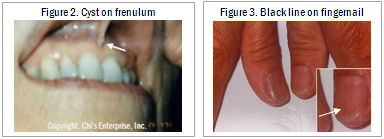Inflammatory Bowel Diseases (Crohn's Disease, Ulcerative Colitis, Diverticulitis)

Inflammatory bowel syndrome (IBS) is chronic inflammation affecting any part of the digestive tract. The most common types are Crohn’s disease, Ulcerative colitis and diverticulitis. Crohn’s disease affects the small intestines or the large intestines or both. Ulcerative colitis, on the other hand, affects the large intestines (colon) and rectum. Diverticulitis is inflammation or infection that develops in pouches that form in the walls of the colon.
IBD SYMPTOMS AND MARKERS
Common symptoms of Crohn’s disease, ulcerative colitis and diverticulitis include the following:
Abdominal pain and cramping
Diarrhea - In some cases, an affected person may have multiple bowel movements daily
Blood in the stool
Loss of appetite
Unintended weight loss
Itchiness or pain around the anus is also prevalent among Crohn’s sufferers.
You can also look for physical markers that indicate irritable bowel disease. In our second featured story, for example, the patient has a geographic tongue, cracks on the tongue and a cyst on the frenulum, all of which point toward his colitis problem.
Cyst on the frenulum (Colon)
In our October 2, 2015 Chi Health Letter issue, we discussed the presence of a cyst on the frenulum (Figure 2), the thin tissue connecting the upper lip to the upper gum, as an indication of a colon problem.
Geographic tongue (Lungs, Colitis, Crohn’s Disease)
A geographic tongue is characterized by a map-like, patchy-looking appearance due to loss of coating in certain areas (Figure 5). It is associated with respiratory issues (asthma or sinusitis). But, after ruling out lung issues, and if there are cracks on the tongue and/or if you already have digestive symptoms, it indicates inflammatory digestive diseases such as Ulcerative colitis or Crohn’s disease. For example, Figure 5 shows a geographic tongue with cracks on the tongue so this indicates an inflammatory bowel disease. Another example is Case 2 above. the patient has a geographic tongue but doesn’t have respiratory issues. However, combining that marker to the presence of cracks on his tongue, a cyst on the frenulum and blood in the stool indicates colitis.
Black Lines on Nails (Bleeding)
Black lines on the nails that move as the nails grow indicate bleeding (Figure 3). If you also have a cyst on the frenulum, then the bleeding is in the colon.
Bleeding in the intestines may be seen as blood in the stool. But minor bleeding may not show up in the stool at all. About 20% of patients with occult blood have colon cancer.
If the lines are tiny, then bleeding could be due to hemorrhoids. If there are multiple black lines on a single nail or multiple lines on multiple nails and there is a cyst in the frenulum and cracks on the tongue, the condition is much more severe.
In some cases of inflammatory bowel disease, bleeding may already be involved.
CROHN'S DISEASE AND ULCERATIVE COLITIS INCREASES RISK OF COLORECTAL CANCER
Studies show that people who have had Crohn’s disease for more than 30 years have a 20% increased risk for colorectal cancer. Similarly, those who have had ulcerative colitis for more than 10 years are at high risk of developing colorectal cancer. We see this in the first featured story above. The patient has chronic ulcerative colitis that has already progressed to bleeding. Indeed, a test showed that he has precancerous cells already forming. Just like in his case where he was able to avoid colostomy, it is important to address the problem and try to reduce flare ups to minimize damage to the colon.
IBD RELATED TO AUTOIMMUNE DISEASES
Studies show that there is a higher incidence of autoimmune problems in people with Crohn’s disease, Ulcerative Colitis, and diverticulitis suggesting that these conditions may be autoimmune in nature. In fact, one of the approved drugs for Crohn’s disease is TNF alpha inhibitor. TNF alpha is an inflammatory cytokine overexpressed in many autoimmune disorders like Rheumatoid arthritis, psoriasis and chronic eczema. It is overexpressed in Crohn’s and Ulcerative colitis as well.
Look to Intestinal Dysbiosis on how to correct these issues.
IBD SYMPTOMS AND MARKERS
Common symptoms of Crohn’s disease, ulcerative colitis and diverticulitis include the following:
Abdominal pain and cramping
Diarrhea - In some cases, an affected person may have multiple bowel movements daily
Blood in the stool
Loss of appetite
Unintended weight loss
Itchiness or pain around the anus is also prevalent among Crohn’s sufferers.
You can also look for physical markers that indicate irritable bowel disease. In our second featured story, for example, the patient has a geographic tongue, cracks on the tongue and a cyst on the frenulum, all of which point toward his colitis problem.
Cyst on the frenulum (Colon)
In our October 2, 2015 Chi Health Letter issue, we discussed the presence of a cyst on the frenulum (Figure 2), the thin tissue connecting the upper lip to the upper gum, as an indication of a colon problem.
Geographic tongue (Lungs, Colitis, Crohn’s Disease)
A geographic tongue is characterized by a map-like, patchy-looking appearance due to loss of coating in certain areas (Figure 5). It is associated with respiratory issues (asthma or sinusitis). But, after ruling out lung issues, and if there are cracks on the tongue and/or if you already have digestive symptoms, it indicates inflammatory digestive diseases such as Ulcerative colitis or Crohn’s disease. For example, Figure 5 shows a geographic tongue with cracks on the tongue so this indicates an inflammatory bowel disease. Another example is Case 2 above. the patient has a geographic tongue but doesn’t have respiratory issues. However, combining that marker to the presence of cracks on his tongue, a cyst on the frenulum and blood in the stool indicates colitis.
Black Lines on Nails (Bleeding)
Black lines on the nails that move as the nails grow indicate bleeding (Figure 3). If you also have a cyst on the frenulum, then the bleeding is in the colon.
Bleeding in the intestines may be seen as blood in the stool. But minor bleeding may not show up in the stool at all. About 20% of patients with occult blood have colon cancer.
If the lines are tiny, then bleeding could be due to hemorrhoids. If there are multiple black lines on a single nail or multiple lines on multiple nails and there is a cyst in the frenulum and cracks on the tongue, the condition is much more severe.
In some cases of inflammatory bowel disease, bleeding may already be involved.
CROHN'S DISEASE AND ULCERATIVE COLITIS INCREASES RISK OF COLORECTAL CANCER
Studies show that people who have had Crohn’s disease for more than 30 years have a 20% increased risk for colorectal cancer. Similarly, those who have had ulcerative colitis for more than 10 years are at high risk of developing colorectal cancer. We see this in the first featured story above. The patient has chronic ulcerative colitis that has already progressed to bleeding. Indeed, a test showed that he has precancerous cells already forming. Just like in his case where he was able to avoid colostomy, it is important to address the problem and try to reduce flare ups to minimize damage to the colon.
IBD RELATED TO AUTOIMMUNE DISEASES
Studies show that there is a higher incidence of autoimmune problems in people with Crohn’s disease, Ulcerative Colitis, and diverticulitis suggesting that these conditions may be autoimmune in nature. In fact, one of the approved drugs for Crohn’s disease is TNF alpha inhibitor. TNF alpha is an inflammatory cytokine overexpressed in many autoimmune disorders like Rheumatoid arthritis, psoriasis and chronic eczema. It is overexpressed in Crohn’s and Ulcerative colitis as well.
Look to Intestinal Dysbiosis on how to correct these issues.

